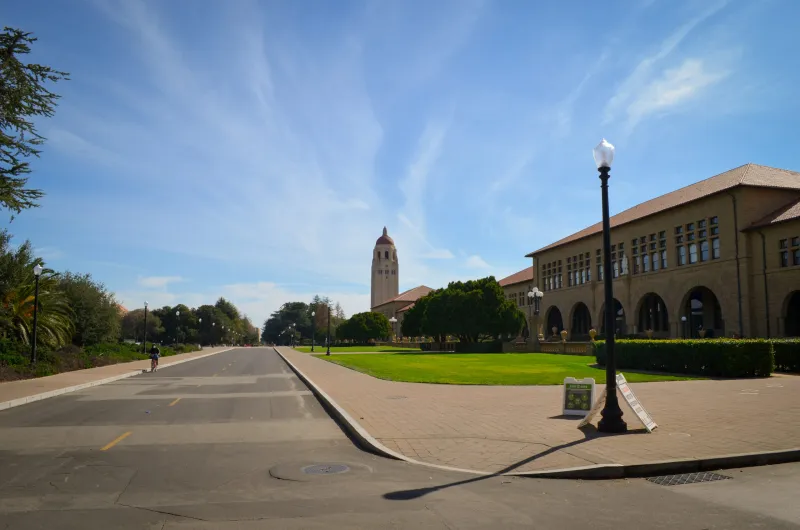Many of us at The Daily were not only dismayed but frustrated to learn of our former colleague and classmate Emily Wilder ’20’s firing from the AP following tweets by the Stanford College Republicans. We were dismayed at the AP’s troubling decision and its evasive reasoning. We were frustrated because, through our time at Stanford and at The Daily, and especially in our reporting on and engagement with the College Republicans, we could see the pattern in the group’s cynical tactics and had thought we could trust an organization like the AP not to fall for them.
The College Republicans’ primary engagement with the broader Stanford community in the past several years has been twofold. First, the group invites controversial right-wing speakers to campus, inevitably rekindling debates about free speech and whether pernicious ideologies should be given a platform. The group frames any opposition to or protest against such events as an attack on free speech, even as no speaker invited by the College Republicans in recent history has been disinvited from a Stanford event.
Second, the group engages in smear tactics against individuals by publicizing old social media or other public posts, almost invariably presented in bad faith and accompanied by extreme characterizations. The group presents these posts as evidence that the individual in question holds distasteful leftist ideologies and is thus unfit for holding some position or office, whether it be residential assistant, undergraduate senator, dean of students or journalist for a national publication.
At the same time as the group targets individuals and insists they be punished for their putatively objectionable speech, the group complains when its own speech is not welcomed in its preferred forums. The group has written that by declining to publish op-eds from the College Republicans that contravene our editorial policies, The Daily “aids and abets violent actors on the left through its dishonesty and its attempts to hide information from the public by omission.” This despite the fact that the group has consistently found a welcome forum for their op-eds in The Stanford Review and that The Daily only began declining submissions when the College Republicans consistently failed to work with editors in good faith to revise submissions for publication.
The implicit stance of the College Republicans is clear: it is an unacceptable contravention of free speech when The Daily and the Stanford community declines to platform and calmly debate whatever opinions they have to share. At the same time, it is unacceptable when those who voice opinions the College Republicans find objectionable are allowed to keep their livelihoods without retribution. Right-wing viewpoints that the left finds objectionable must be promoted and elevated in the interest of free speech. But those leftists and left-wing viewpoints that the College Republicans find objectionable cannot be left unpunished.
Those familiar with the College Republicans’ bad-faith tactics, including Wilder herself, have suggested that one way to counteract them is to pay the group no attention. It is clearest to see how this could work in the context of speakers invited by the College Republicans. If, instead of protesting and condemning them, the broader community simply ignored such events, each event would no longer be subject to volleying op-eds, spectacle and the inevitable attention that controversy gathers.
But more and more, and especially in Wilder’s firing, we see the limits of such a response. Even when, like in the recent case of an undergraduate senator running for reelection, a smear campaign leads to no substantive action, it remains an attack on an individual, with all its attendant harm. And defense against the College Republicans’ smear tactics depends, to some degree, upon the community’s familiarity with their methods. The College Republicans’ tactics thus can still be highly effective with those who are either unable or unwilling to see the basic motives of the group — notably those outside the Stanford community who know them only as an undergraduate Republican group. In Wilder’s case, when the group’s attacks were elevated by right-wing outlets, the AP bowed to a smear campaign attempting to link a 22-year-old news associate based in Arizona with its Middle-East reporting — and fired her.
Those of us at Stanford who have observed the College Republicans at work for the past several years can see that they have only the power they are afforded by those who legitimize their tactics. But this is not enough as long as the group can convince organizations beyond Stanford, such as the AP and right-wing outlets, that their power and influence is real and threatening. This influence, as long as it is legitimized and thus made real, will continue to chill the voices of those in the Stanford community.
The Daily is committed to publishing a diversity of op-eds and letters to the editor. We’d love to hear your thoughts. Email letters to the editor to eic ‘at’ stanforddaily.com and op-ed submissions to opinions ‘at’ stanforddaily.com.
